Profits vs. Purpose: Examining Corporate Social Responsibility (CSR)
VerifiedAdded on 2023/05/30
|6
|1415
|497
Essay
AI Summary
This essay defines profit and corporate social responsibility (CSR), highlighting their importance in business. It discusses the types of activities that constitute CSR, such as respecting human rights, ensuring optimal working conditions, and engaging in fair business practices. The essay explores how profits and CSR are linked, noting that CSR activities can enhance a company's image, attract customers and investors, and ultimately boost profit levels. It also presents the advantages and disadvantages of focusing on profits versus CSR, using examples like Starbucks to illustrate the practical application of CSR. The essay concludes that while profit-making is a key objective for businesses, CSR is equally crucial for long-term sustainability and positive societal impact.
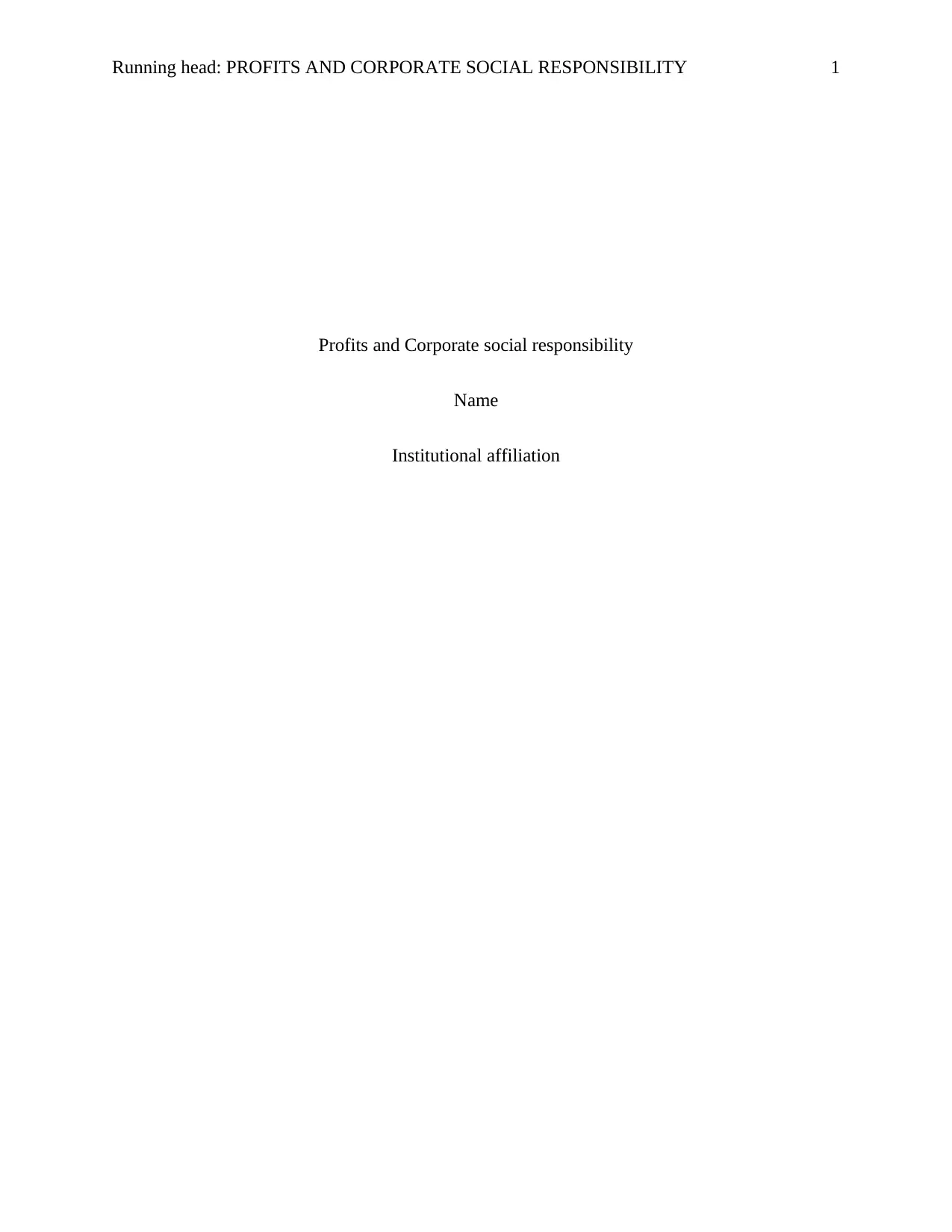
Running head: PROFITS AND CORPORATE SOCIAL RESPONSIBILITY 1
Profits and Corporate social responsibility
Name
Institutional affiliation
Profits and Corporate social responsibility
Name
Institutional affiliation
Paraphrase This Document
Need a fresh take? Get an instant paraphrase of this document with our AI Paraphraser
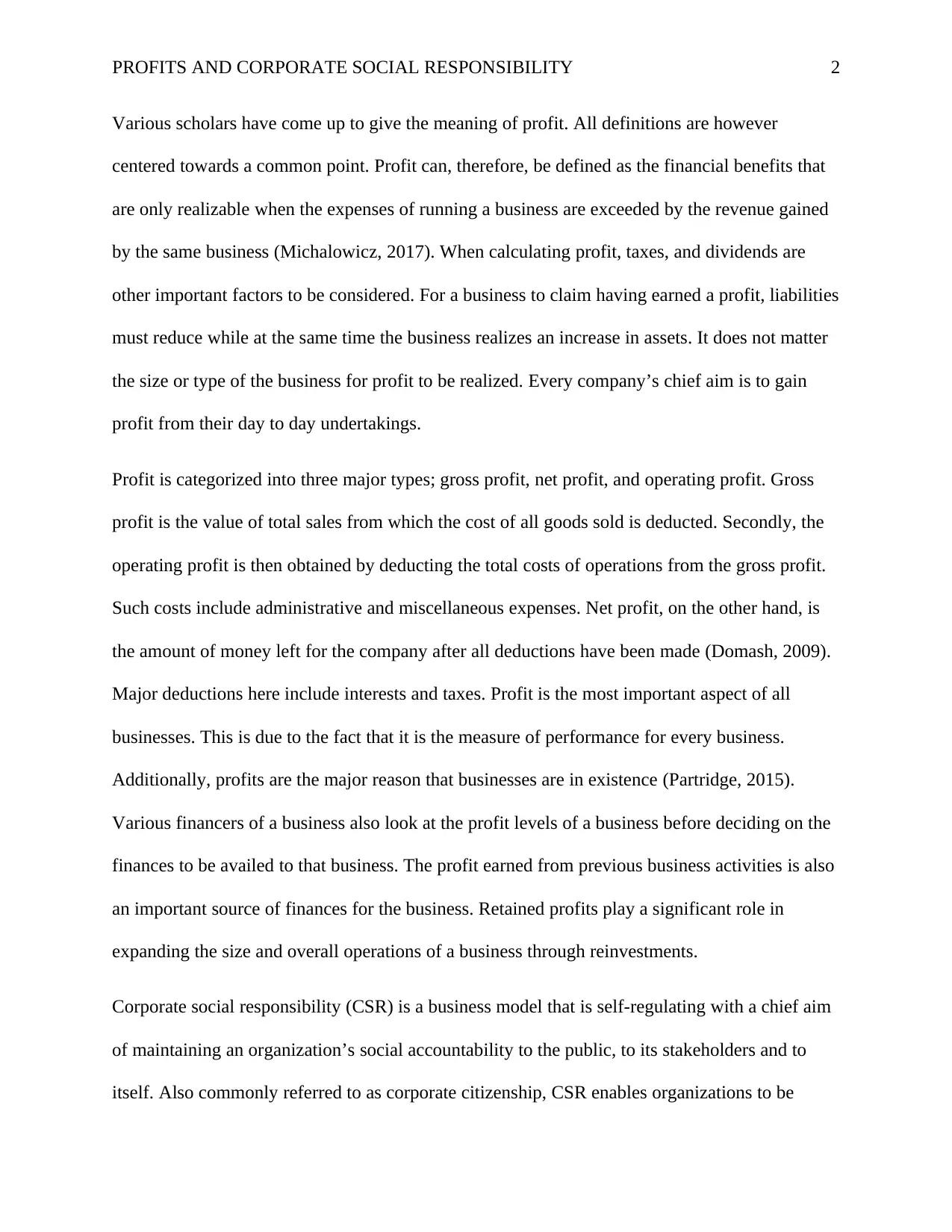
PROFITS AND CORPORATE SOCIAL RESPONSIBILITY 2
Various scholars have come up to give the meaning of profit. All definitions are however
centered towards a common point. Profit can, therefore, be defined as the financial benefits that
are only realizable when the expenses of running a business are exceeded by the revenue gained
by the same business (Michalowicz, 2017). When calculating profit, taxes, and dividends are
other important factors to be considered. For a business to claim having earned a profit, liabilities
must reduce while at the same time the business realizes an increase in assets. It does not matter
the size or type of the business for profit to be realized. Every company’s chief aim is to gain
profit from their day to day undertakings.
Profit is categorized into three major types; gross profit, net profit, and operating profit. Gross
profit is the value of total sales from which the cost of all goods sold is deducted. Secondly, the
operating profit is then obtained by deducting the total costs of operations from the gross profit.
Such costs include administrative and miscellaneous expenses. Net profit, on the other hand, is
the amount of money left for the company after all deductions have been made (Domash, 2009).
Major deductions here include interests and taxes. Profit is the most important aspect of all
businesses. This is due to the fact that it is the measure of performance for every business.
Additionally, profits are the major reason that businesses are in existence (Partridge, 2015).
Various financers of a business also look at the profit levels of a business before deciding on the
finances to be availed to that business. The profit earned from previous business activities is also
an important source of finances for the business. Retained profits play a significant role in
expanding the size and overall operations of a business through reinvestments.
Corporate social responsibility (CSR) is a business model that is self-regulating with a chief aim
of maintaining an organization’s social accountability to the public, to its stakeholders and to
itself. Also commonly referred to as corporate citizenship, CSR enables organizations to be
Various scholars have come up to give the meaning of profit. All definitions are however
centered towards a common point. Profit can, therefore, be defined as the financial benefits that
are only realizable when the expenses of running a business are exceeded by the revenue gained
by the same business (Michalowicz, 2017). When calculating profit, taxes, and dividends are
other important factors to be considered. For a business to claim having earned a profit, liabilities
must reduce while at the same time the business realizes an increase in assets. It does not matter
the size or type of the business for profit to be realized. Every company’s chief aim is to gain
profit from their day to day undertakings.
Profit is categorized into three major types; gross profit, net profit, and operating profit. Gross
profit is the value of total sales from which the cost of all goods sold is deducted. Secondly, the
operating profit is then obtained by deducting the total costs of operations from the gross profit.
Such costs include administrative and miscellaneous expenses. Net profit, on the other hand, is
the amount of money left for the company after all deductions have been made (Domash, 2009).
Major deductions here include interests and taxes. Profit is the most important aspect of all
businesses. This is due to the fact that it is the measure of performance for every business.
Additionally, profits are the major reason that businesses are in existence (Partridge, 2015).
Various financers of a business also look at the profit levels of a business before deciding on the
finances to be availed to that business. The profit earned from previous business activities is also
an important source of finances for the business. Retained profits play a significant role in
expanding the size and overall operations of a business through reinvestments.
Corporate social responsibility (CSR) is a business model that is self-regulating with a chief aim
of maintaining an organization’s social accountability to the public, to its stakeholders and to
itself. Also commonly referred to as corporate citizenship, CSR enables organizations to be
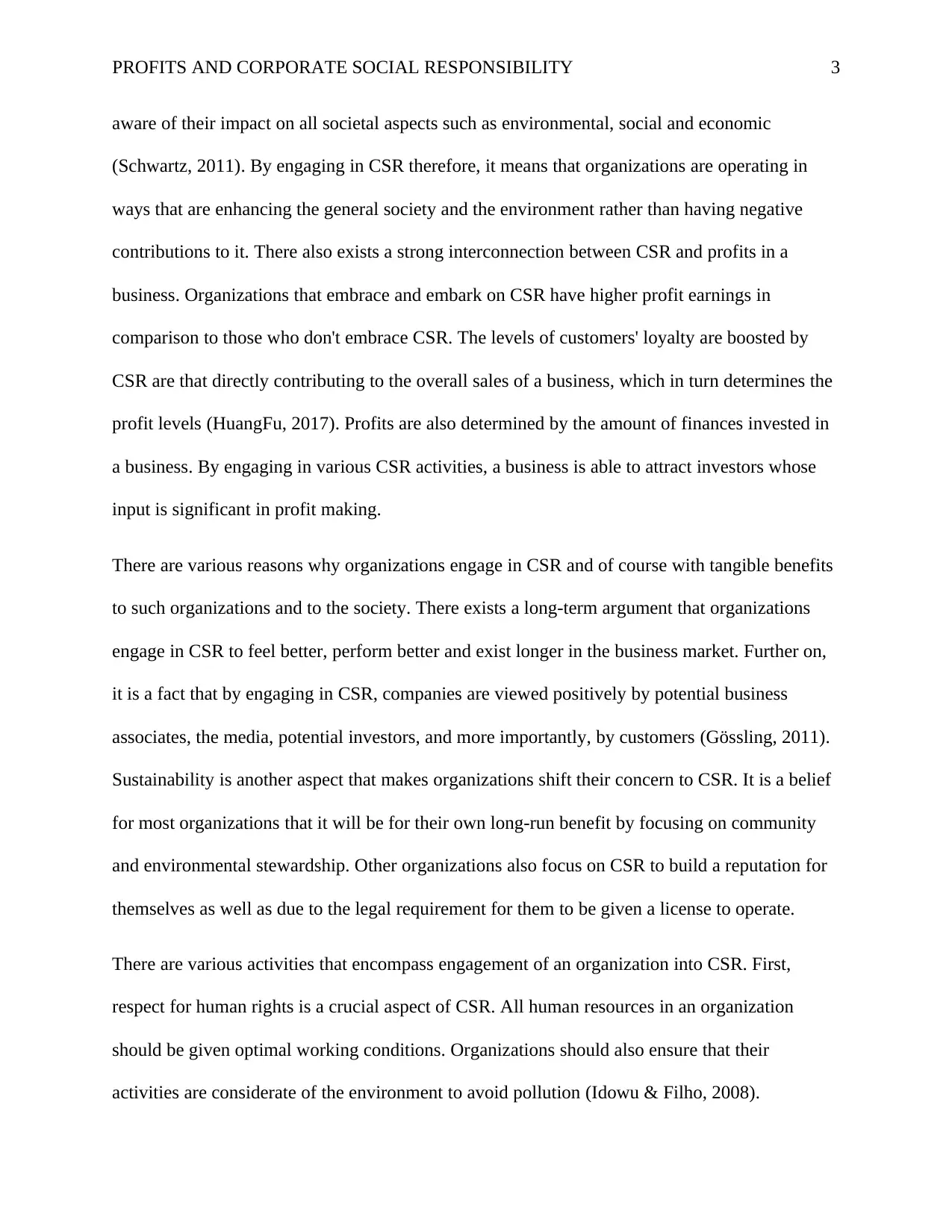
PROFITS AND CORPORATE SOCIAL RESPONSIBILITY 3
aware of their impact on all societal aspects such as environmental, social and economic
(Schwartz, 2011). By engaging in CSR therefore, it means that organizations are operating in
ways that are enhancing the general society and the environment rather than having negative
contributions to it. There also exists a strong interconnection between CSR and profits in a
business. Organizations that embrace and embark on CSR have higher profit earnings in
comparison to those who don't embrace CSR. The levels of customers' loyalty are boosted by
CSR are that directly contributing to the overall sales of a business, which in turn determines the
profit levels (HuangFu, 2017). Profits are also determined by the amount of finances invested in
a business. By engaging in various CSR activities, a business is able to attract investors whose
input is significant in profit making.
There are various reasons why organizations engage in CSR and of course with tangible benefits
to such organizations and to the society. There exists a long-term argument that organizations
engage in CSR to feel better, perform better and exist longer in the business market. Further on,
it is a fact that by engaging in CSR, companies are viewed positively by potential business
associates, the media, potential investors, and more importantly, by customers (Gössling, 2011).
Sustainability is another aspect that makes organizations shift their concern to CSR. It is a belief
for most organizations that it will be for their own long-run benefit by focusing on community
and environmental stewardship. Other organizations also focus on CSR to build a reputation for
themselves as well as due to the legal requirement for them to be given a license to operate.
There are various activities that encompass engagement of an organization into CSR. First,
respect for human rights is a crucial aspect of CSR. All human resources in an organization
should be given optimal working conditions. Organizations should also ensure that their
activities are considerate of the environment to avoid pollution (Idowu & Filho, 2008).
aware of their impact on all societal aspects such as environmental, social and economic
(Schwartz, 2011). By engaging in CSR therefore, it means that organizations are operating in
ways that are enhancing the general society and the environment rather than having negative
contributions to it. There also exists a strong interconnection between CSR and profits in a
business. Organizations that embrace and embark on CSR have higher profit earnings in
comparison to those who don't embrace CSR. The levels of customers' loyalty are boosted by
CSR are that directly contributing to the overall sales of a business, which in turn determines the
profit levels (HuangFu, 2017). Profits are also determined by the amount of finances invested in
a business. By engaging in various CSR activities, a business is able to attract investors whose
input is significant in profit making.
There are various reasons why organizations engage in CSR and of course with tangible benefits
to such organizations and to the society. There exists a long-term argument that organizations
engage in CSR to feel better, perform better and exist longer in the business market. Further on,
it is a fact that by engaging in CSR, companies are viewed positively by potential business
associates, the media, potential investors, and more importantly, by customers (Gössling, 2011).
Sustainability is another aspect that makes organizations shift their concern to CSR. It is a belief
for most organizations that it will be for their own long-run benefit by focusing on community
and environmental stewardship. Other organizations also focus on CSR to build a reputation for
themselves as well as due to the legal requirement for them to be given a license to operate.
There are various activities that encompass engagement of an organization into CSR. First,
respect for human rights is a crucial aspect of CSR. All human resources in an organization
should be given optimal working conditions. Organizations should also ensure that their
activities are considerate of the environment to avoid pollution (Idowu & Filho, 2008).
⊘ This is a preview!⊘
Do you want full access?
Subscribe today to unlock all pages.

Trusted by 1+ million students worldwide
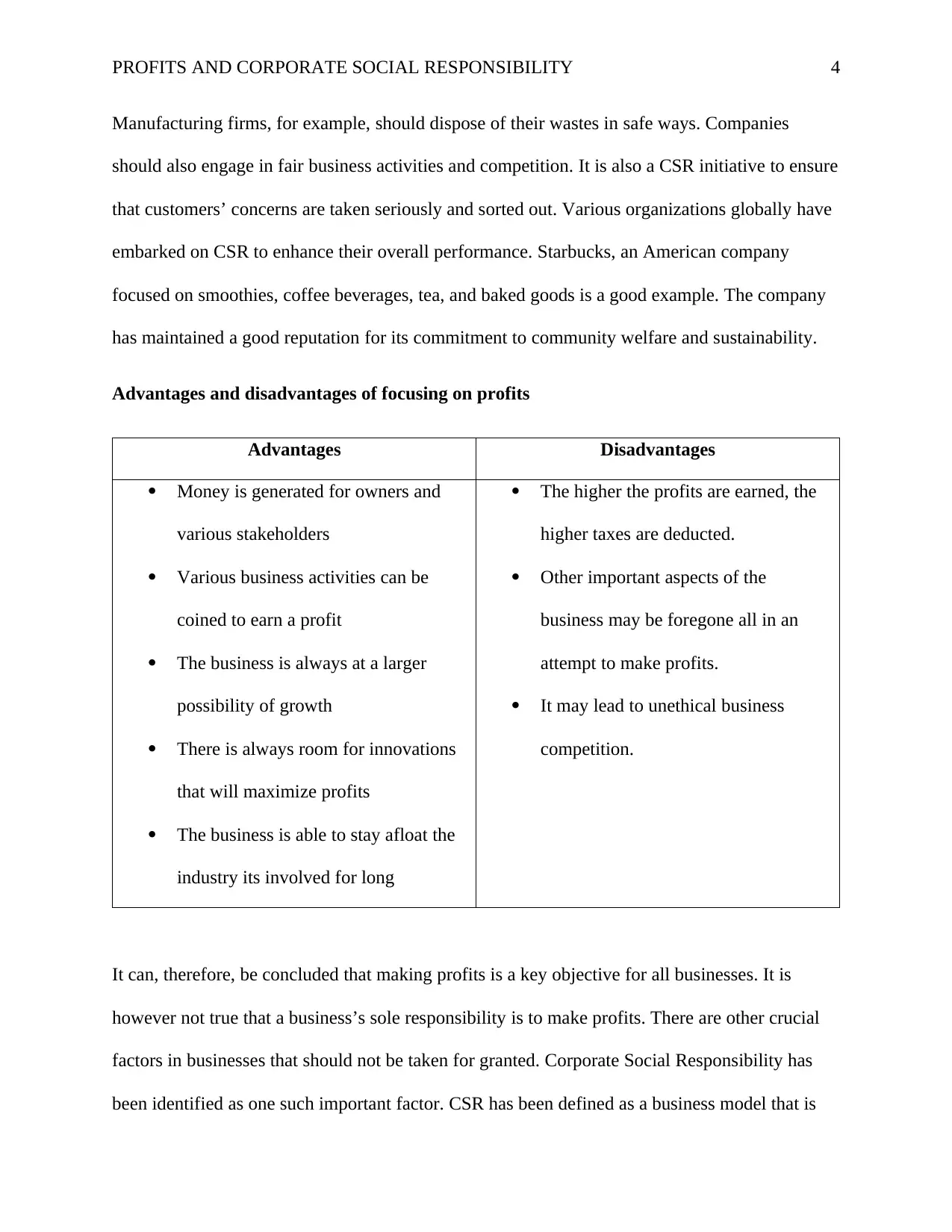
PROFITS AND CORPORATE SOCIAL RESPONSIBILITY 4
Manufacturing firms, for example, should dispose of their wastes in safe ways. Companies
should also engage in fair business activities and competition. It is also a CSR initiative to ensure
that customers’ concerns are taken seriously and sorted out. Various organizations globally have
embarked on CSR to enhance their overall performance. Starbucks, an American company
focused on smoothies, coffee beverages, tea, and baked goods is a good example. The company
has maintained a good reputation for its commitment to community welfare and sustainability.
Advantages and disadvantages of focusing on profits
Advantages Disadvantages
Money is generated for owners and
various stakeholders
Various business activities can be
coined to earn a profit
The business is always at a larger
possibility of growth
There is always room for innovations
that will maximize profits
The business is able to stay afloat the
industry its involved for long
The higher the profits are earned, the
higher taxes are deducted.
Other important aspects of the
business may be foregone all in an
attempt to make profits.
It may lead to unethical business
competition.
It can, therefore, be concluded that making profits is a key objective for all businesses. It is
however not true that a business’s sole responsibility is to make profits. There are other crucial
factors in businesses that should not be taken for granted. Corporate Social Responsibility has
been identified as one such important factor. CSR has been defined as a business model that is
Manufacturing firms, for example, should dispose of their wastes in safe ways. Companies
should also engage in fair business activities and competition. It is also a CSR initiative to ensure
that customers’ concerns are taken seriously and sorted out. Various organizations globally have
embarked on CSR to enhance their overall performance. Starbucks, an American company
focused on smoothies, coffee beverages, tea, and baked goods is a good example. The company
has maintained a good reputation for its commitment to community welfare and sustainability.
Advantages and disadvantages of focusing on profits
Advantages Disadvantages
Money is generated for owners and
various stakeholders
Various business activities can be
coined to earn a profit
The business is always at a larger
possibility of growth
There is always room for innovations
that will maximize profits
The business is able to stay afloat the
industry its involved for long
The higher the profits are earned, the
higher taxes are deducted.
Other important aspects of the
business may be foregone all in an
attempt to make profits.
It may lead to unethical business
competition.
It can, therefore, be concluded that making profits is a key objective for all businesses. It is
however not true that a business’s sole responsibility is to make profits. There are other crucial
factors in businesses that should not be taken for granted. Corporate Social Responsibility has
been identified as one such important factor. CSR has been defined as a business model that is
Paraphrase This Document
Need a fresh take? Get an instant paraphrase of this document with our AI Paraphraser
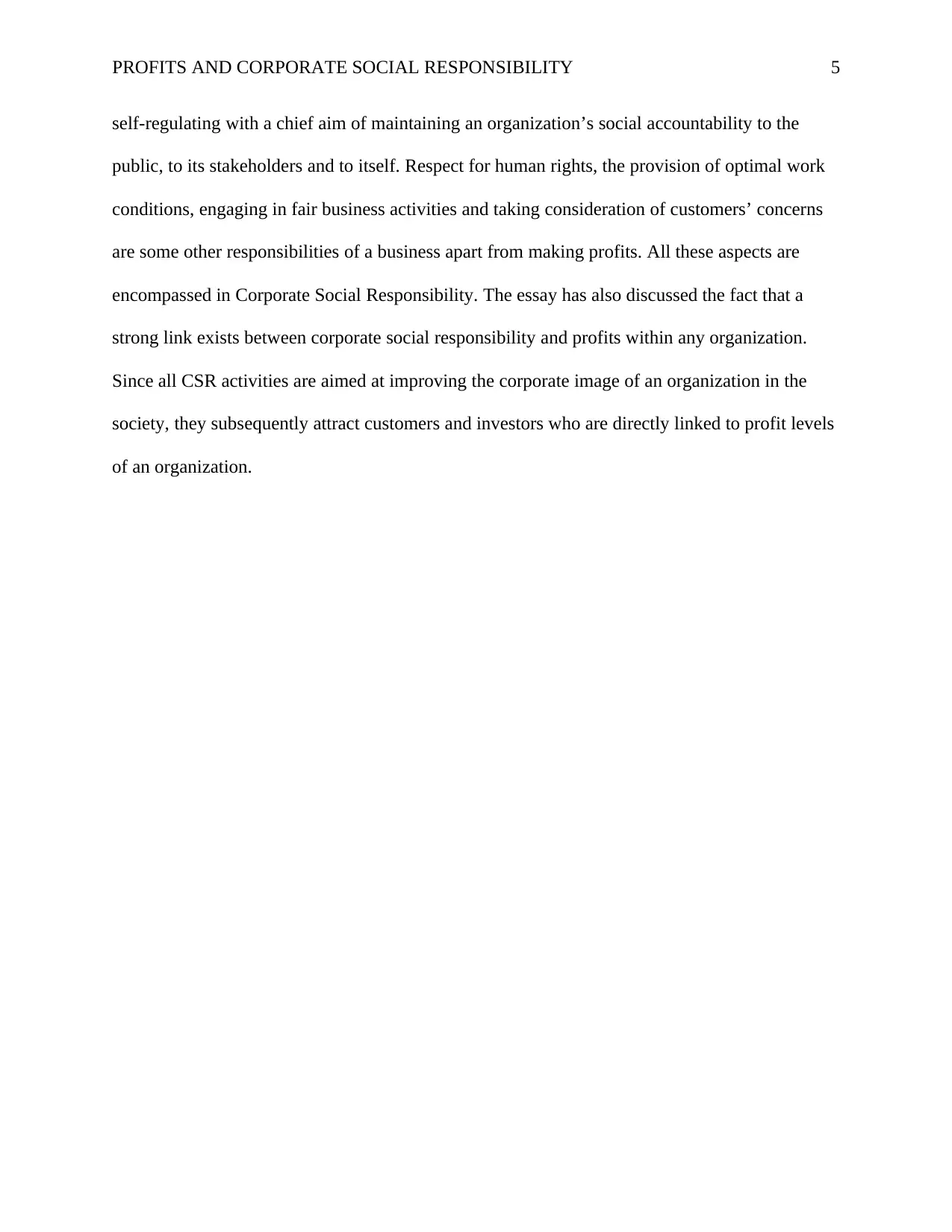
PROFITS AND CORPORATE SOCIAL RESPONSIBILITY 5
self-regulating with a chief aim of maintaining an organization’s social accountability to the
public, to its stakeholders and to itself. Respect for human rights, the provision of optimal work
conditions, engaging in fair business activities and taking consideration of customers’ concerns
are some other responsibilities of a business apart from making profits. All these aspects are
encompassed in Corporate Social Responsibility. The essay has also discussed the fact that a
strong link exists between corporate social responsibility and profits within any organization.
Since all CSR activities are aimed at improving the corporate image of an organization in the
society, they subsequently attract customers and investors who are directly linked to profit levels
of an organization.
self-regulating with a chief aim of maintaining an organization’s social accountability to the
public, to its stakeholders and to itself. Respect for human rights, the provision of optimal work
conditions, engaging in fair business activities and taking consideration of customers’ concerns
are some other responsibilities of a business apart from making profits. All these aspects are
encompassed in Corporate Social Responsibility. The essay has also discussed the fact that a
strong link exists between corporate social responsibility and profits within any organization.
Since all CSR activities are aimed at improving the corporate image of an organization in the
society, they subsequently attract customers and investors who are directly linked to profit levels
of an organization.
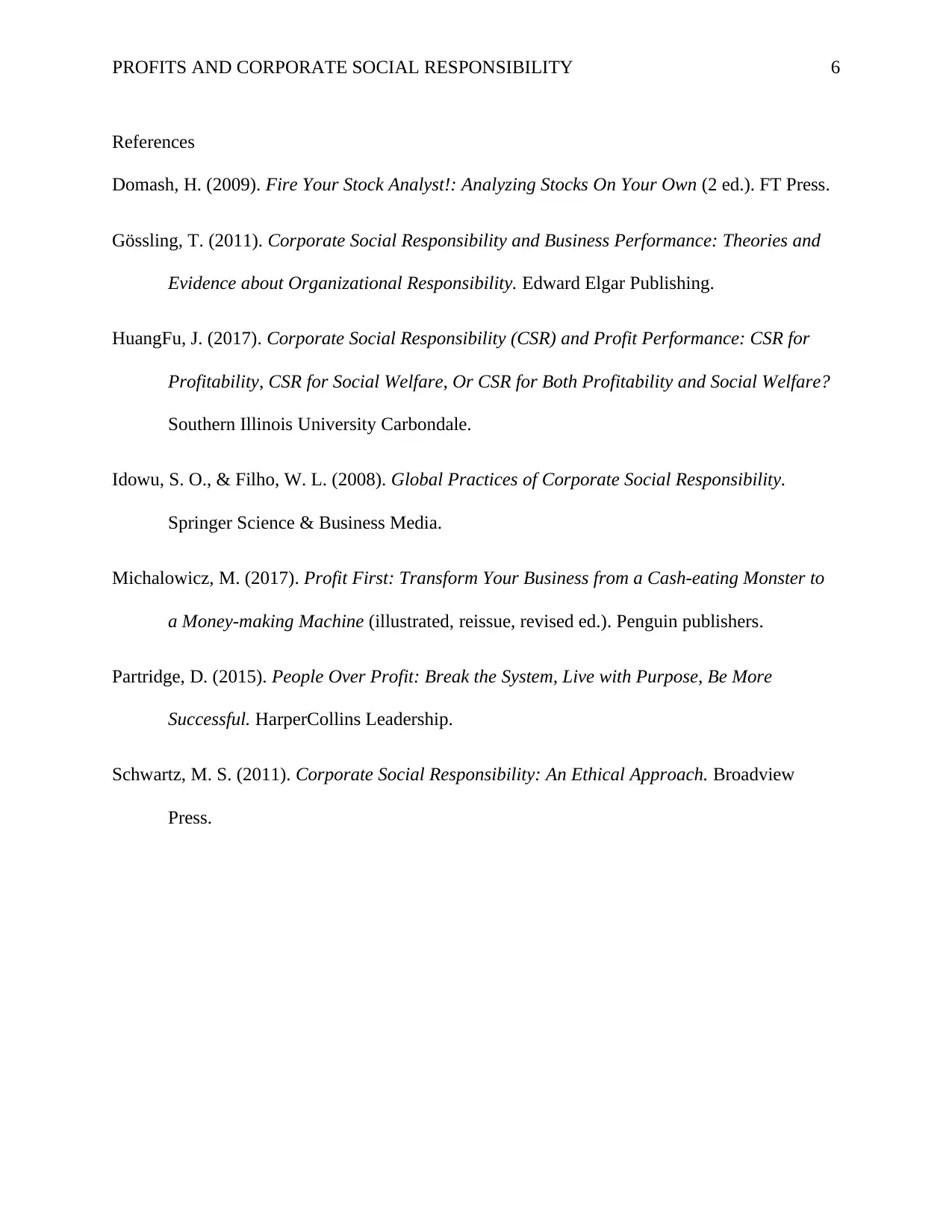
PROFITS AND CORPORATE SOCIAL RESPONSIBILITY 6
References
Domash, H. (2009). Fire Your Stock Analyst!: Analyzing Stocks On Your Own (2 ed.). FT Press.
Gössling, T. (2011). Corporate Social Responsibility and Business Performance: Theories and
Evidence about Organizational Responsibility. Edward Elgar Publishing.
HuangFu, J. (2017). Corporate Social Responsibility (CSR) and Profit Performance: CSR for
Profitability, CSR for Social Welfare, Or CSR for Both Profitability and Social Welfare?
Southern Illinois University Carbondale.
Idowu, S. O., & Filho, W. L. (2008). Global Practices of Corporate Social Responsibility.
Springer Science & Business Media.
Michalowicz, M. (2017). Profit First: Transform Your Business from a Cash-eating Monster to
a Money-making Machine (illustrated, reissue, revised ed.). Penguin publishers.
Partridge, D. (2015). People Over Profit: Break the System, Live with Purpose, Be More
Successful. HarperCollins Leadership.
Schwartz, M. S. (2011). Corporate Social Responsibility: An Ethical Approach. Broadview
Press.
References
Domash, H. (2009). Fire Your Stock Analyst!: Analyzing Stocks On Your Own (2 ed.). FT Press.
Gössling, T. (2011). Corporate Social Responsibility and Business Performance: Theories and
Evidence about Organizational Responsibility. Edward Elgar Publishing.
HuangFu, J. (2017). Corporate Social Responsibility (CSR) and Profit Performance: CSR for
Profitability, CSR for Social Welfare, Or CSR for Both Profitability and Social Welfare?
Southern Illinois University Carbondale.
Idowu, S. O., & Filho, W. L. (2008). Global Practices of Corporate Social Responsibility.
Springer Science & Business Media.
Michalowicz, M. (2017). Profit First: Transform Your Business from a Cash-eating Monster to
a Money-making Machine (illustrated, reissue, revised ed.). Penguin publishers.
Partridge, D. (2015). People Over Profit: Break the System, Live with Purpose, Be More
Successful. HarperCollins Leadership.
Schwartz, M. S. (2011). Corporate Social Responsibility: An Ethical Approach. Broadview
Press.
⊘ This is a preview!⊘
Do you want full access?
Subscribe today to unlock all pages.

Trusted by 1+ million students worldwide
1 out of 6
Related Documents
Your All-in-One AI-Powered Toolkit for Academic Success.
+13062052269
info@desklib.com
Available 24*7 on WhatsApp / Email
![[object Object]](/_next/static/media/star-bottom.7253800d.svg)
Unlock your academic potential
Copyright © 2020–2025 A2Z Services. All Rights Reserved. Developed and managed by ZUCOL.





